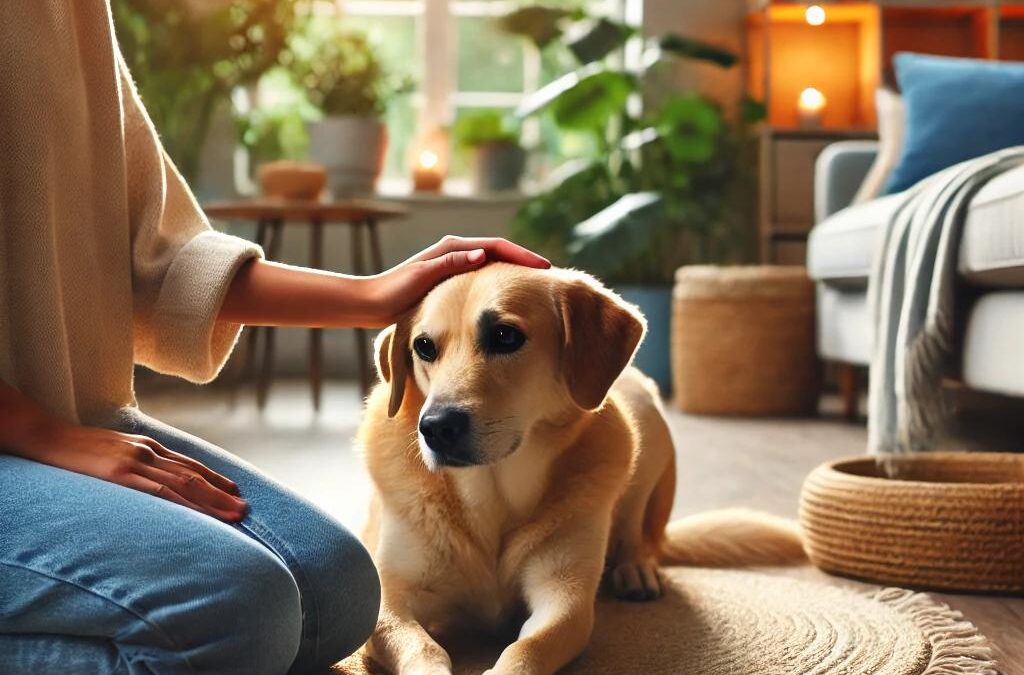
von TCMVET | 21. September 2024 | Krebs und Tumore bei Hunden
Zysten bei Hunden kommen häufig vor und können verschiedene Ursachen haben. Diese mit Flüssigkeit gefüllten oder halbfesten Säckchen können unter der Haut oder in inneren Organen auftreten. Obwohl die meisten Zysten gutartig und harmlos sind, ist es wichtig zu verstehen, was sie verursacht und wann sie tierärztliche Behandlung erfordern.
Häufige Ursachen für Zysten bei Hunden
- Inflammation: Eine der Hauptursachen für die Bildung von Zysten sind Entzündungen. Wenn sich die Haut eines Hundes aufgrund einer Infektion, Reizung oder einer allergischen Reaktion entzündet, können die Drüsen oder Haarfollikel verstopft werden, was zu Zysten führt.
- Trauma: Auch körperliche Verletzungen der Haut können Zysten auslösen. Wenn Ihr Hund zerkratzt, gebissen oder verletzt wurde, kann sich das beschädigte Gewebe im Rahmen des Heilungsprozesses des Körpers zu einer Zyste entwickeln.
- Verstopfte Haarfollikel und Hautdrüsen: Genau wie beim Menschen können die Haarfollikel und Talgdrüsen von Hunden verstopft werden. Wenn diese Bahnen blockiert sind, kann sich Flüssigkeit oder Material ansammeln, was zur Bildung einer Zyste führt. Dies kommt besonders häufig bei Hunden mit fettiger Haut oder in Bereichen vor, in denen die Fellpflege die Haut reizen kann.
- Übermäßige Fellpflege: Übermäßige Fellpflege, sei es durch Lecken oder Bürsten, kann manchmal die Haut reizen und Zysten auslösen. Wiederholte Reizungen können leichte Verletzungen der Hautoberfläche verursachen, die zu verstopften Follikeln oder Drüsen führen, was wiederum zur Entstehung von Zysten führt.
Zu Zysten neigende Rassen
Zysten können sich bei Hunden jeder Rasse und jeden Alters bilden, aber bestimmte Rassen haben eine genetische Veranlagung. Zu den Hunden, die häufiger Zysten entwickeln, gehören:
- Cocker Spaniels: Cocker Spaniels sind für ihr dickes Fell und ihre empfindliche Haut bekannt und neigen zu Talgzysten.
- Boxer: Diese Rasse neigt zur Entwicklung verschiedener Hautwucherungen, einschließlich Zysten, insbesondere mit zunehmendem Alter.
- Golden Retriever: Ihr dickes Doppelfell und ihre Hautbeschaffenheit machen sie anfällig für Zystenbildung.
- Schnauzer: Bei Schnauzern bilden sich häufig Komedonen oder „Schnauzerbeulen“, eine Art Zyste, die durch verstopfte Haarfollikel entsteht.
Arten von Hundezysten
Zysten können je nach Ursache in Größe und Aussehen variieren. Einige häufige Typen sind:
- Talgzysten: Diese werden durch verstopfte Talgdrüsen verursacht und sind mit einer wachsartigen Substanz gefüllt. Sie kommen bei vielen Rassen häufig vor, insbesondere bei solchen mit fettiger Haut.
- Follikuläre Zysten: Diese bilden sich, wenn Haarfollikel verstopft werden, häufig aufgrund von Hautinfektionen oder übermäßiger Pflege.
- Dermoidzysten: Diese sind angeboren und treten auf, wenn sich die Hautschichten während der Entwicklung nicht richtig trennen, was zur Bildung einer Zyste führt.
Behandlung und Prävention
Die meisten Zysten bei Hunden sind gutartig und müssen nicht behandelt werden, es sei denn, sie entzünden sich oder werden so groß, dass sie Beschwerden verursachen. In Fällen, in denen eine Zyste schmerzhaft oder störend wird, kann ein Tierarzt empfehlen, sie zu drainieren oder chirurgisch zu entfernen. Regelmäßige Fellpflege, Kontrolle auf Knoten und die allgemeine Gesundheit der Haut Ihres Hundes können helfen, die Bildung von Zysten zu verhindern. Wenn Sie ungewöhnliche Knoten oder Beulen bei Ihrem Hund bemerken, sollten Sie immer Ihren Tierarzt aufsuchen, um eine richtige Diagnose zu erhalten.
Zysten bei Hunden können sich aus verschiedenen Gründen bilden, darunter Entzündungen, Traumata, verstopfte Drüsen und übermäßige Fellpflege. Während diese Wucherungen normalerweise harmlos sind, neigen bestimmte Rassen aufgrund genetischer Faktoren eher zur Zystenbildung. Wenn Sie die Ursachen kennen und wissen, wann Sie tierärztlichen Rat einholen sollten, bleibt Ihr Hund gesund und wohlauf.

von TCMVET | 20. September 2024 | Krebs und Tumore bei Hunden
Wenn Sie als Haustierbesitzer einen Knoten bei Ihrem Hund entdecken, kann das beunruhigend sein. Diese Knoten können entweder Zysten oder Tumore sein, die sich beide ähnlich präsentieren, sich aber in Bezug auf Schwere und Behandlung erheblich unterscheiden. Das Erkennen der Unterschiede zwischen Zysten und Tumoren bei Hunden ist entscheidend, um die beste Vorgehensweise zu bestimmen und die Gesundheit Ihres Hundes sicherzustellen.
Was sind Zysten bei Hunden?
Zysten sind geschlossene Gewebetaschen, die sich in der Haut bilden und normalerweise mit Flüssigkeit oder festem Material gefüllt sind. Sie werden oft von Tierbesitzern entdeckt, wenn sie ihren Hund streicheln oder bürsten. Zysten entwickeln sich im Allgemeinen langsam im Laufe der Zeit und sind normalerweise gutartig, d. h. sie sind nicht krebsartig.
Die meisten Zysten fühlen sich weich an und sind unter der Haut etwas beweglich, manche können sich jedoch je nach Größe und Inhalt fester anfühlen. Zysten sind zwar nicht bedrohlich, können sich aber gelegentlich infizieren oder so groß werden, dass sie Beschwerden verursachen, die einen tierärztlichen Eingriff erforderlich machen können.
Was sind Tumore bei Hunden?
Tumore hingegen sind abnorme Zellwucherungen, die gutartig oder bösartig (krebsartig) sein können. Tumore können überall am Körper eines Hundes auftreten und fühlen sich im Gegensatz zu Zysten fester an und sind unter der Haut weniger beweglich. Die Wachstumsgeschwindigkeit von Tumoren variiert; manche Tumore wachsen schnell, während andere eine gewisse Zeit brauchen, um sich zu entwickeln.
Bösartige Tumore stellen ein größeres Risiko für die Gesundheit eines Hundes dar. Sie können sich auf andere Körperteile ausbreiten und lebenswichtige Organe schädigen, weshalb eine frühzeitige Erkennung und Behandlung unerlässlich sind. Selbst gutartige Tumore, obwohl sie nicht krebsartig sind, können Probleme verursachen, wenn sie zu groß werden oder auf nahe gelegene Organe drücken.
Wichtige Unterschiede zwischen Zysten und Tumoren
Obwohl Zysten und Tumoren ähnlich aussehen können, weil sie beide aus der Haut hervorstehen, gibt es wichtige Unterschiede:
- Consistency: Zysten sind im Allgemeinen weicher und mit Flüssigkeit oder Material gefüllt, während Tumore eher fest und weniger beweglich sind.
- Wachstumsrate: Zysten entwickeln sich langsam im Laufe der Zeit, während Tumore unterschiedlich schnell wachsen können, manche sogar sehr schnell.
- Ursache: Zysten sind gutartig, während Tumore entweder gutartig oder bösartig sein können.
- Risiko: Zysten sind nicht lebensbedrohlich, Tumore, insbesondere bösartige, können sich jedoch ausbreiten und gefährlich werden.
Warum eine genaue Diagnose entscheidend ist
Obwohl Zysten normalerweise harmlos sind, ist es dennoch wichtig, dass jeder Knoten oder jede Wucherung bei Ihrem Hund von einem Tierarzt untersucht wird. Eine korrekte Diagnose stellt sicher, dass Sie wissen, ob die Wucherung gutartig oder etwas Ernsteres ist. Tierärzte können Methoden wie Feinnadelaspiration, Biopsie oder bildgebende Verfahren wie Ultraschall verwenden, um die Art des Knotens zu bestimmen.
Wenn Sie wissen, ob Ihr Hund eine Zyste oder einen Tumor hat, können Sie den Behandlungsplan bestimmen. Zysten können entleert oder operativ entfernt werden, wenn sie Beschwerden verursachen, aber Tumore – insbesondere bösartige – erfordern oft eine aggressivere Behandlung wie eine Operation, Bestrahlung oder Chemotherapie.
Behandlungsmöglichkeiten für Zysten vs. Tumore
- Zysten: Die Behandlung von Zysten ist in der Regel weniger invasiv. In vielen Fällen ist keine Behandlung erforderlich, es sei denn, sie entzünden sich oder sind unangenehm. In solchen Fällen können sie drainiert oder operativ entfernt werden.
- Tumoren: Bei gutartigen Tumoren kann eine Entfernung eine Option sein, wenn der Tumor groß ist oder Probleme verursacht. Bösartige Tumoren erfordern jedoch eine umfassendere Behandlung, um ihre Ausbreitung zu verhindern. Dazu können je nach Art und Stadium des Krebses eine Operation, Strahlentherapie oder Chemotherapie gehören.
Wenn Sie bei Ihrem Hund einen Knoten entdecken, sollten Sie nicht in Panik geraten, sondern professionellen Rat einholen. Während Zysten im Allgemeinen harmlos sind und langsam wachsen, können Tumore ein ernstes Gesundheitsrisiko darstellen, insbesondere wenn sie bösartig sind. Die Konsultation Ihres Tierarztes für eine genaue Diagnose ist der beste Weg, um festzustellen, ob es sich bei dem Knoten um eine Zyste oder einen Tumor handelt, und um sicherzustellen, dass Ihr Hund die entsprechende Behandlung erhält. Früherkennung und Intervention sind der Schlüssel, um Ihren pelzigen Freund gesund und glücklich zu halten.

von TCMVET | 20. September 2024 | Krebs und Tumore bei Hunden
Das entzündliche Mammakarzinom (IMC) bei Hunden ist eine der aggressivsten Formen von Brustkrebs. Diese Erkrankung zeigt sich typischerweise als rasch fortschreitender Tumor, der sich stark ausbreitet, was eine wirksame Behandlung erschwert. Im Gegensatz zu anderen Formen von Brusttumoren neigt das IMC dazu, schon früh in umliegendes Gewebe einzudringen und sich im ganzen Körper auszubreiten, noch bevor eine Diagnose gestellt wird. Aufgrund seiner aggressiven Natur ist die Prognose für Hunde mit entzündlichem Mammakarzinom oft schlecht.
Warum eine Operation bei IMC keine wirksame Option ist
Eine Operation, die bei vielen Krebsarten oft die erste Wahl ist, ist bei Hunden mit entzündlichem Brustkrebs tendenziell weniger wirksam. Einer der Hauptgründe sind die mikroskopisch kleinen Krebszellen, die weit über die tastbare Masse hinausragen, was eine vollständige chirurgische Entfernung nahezu unmöglich macht. Selbst wenn der sichtbare Tumor entfernt wird, besteht eine hohe Wahrscheinlichkeit, dass sich der Krebs bereits auf andere Körperteile ausgebreitet hat, insbesondere über das Lymphsystem.
Tatsächlich haben Studien gezeigt, dass eine Operation die Überlebensrate bei Hunden mit IMC nicht unbedingt verbessert. Dies liegt daran, dass der Tumor zum Zeitpunkt seiner Entdeckung oft bereits in lebenswichtige Organe wie Lunge, Leber und Lymphknoten metastasiert ist. Infolgedessen verlagert sich der Schwerpunkt der Behandlung in der Regel auf Palliativpflege und die Behandlung der Symptome, anstatt zu versuchen, die Krankheit durch eine Operation zu heilen.
Aktuelle Behandlungsmöglichkeiten: Strahlentherapie und NSAIDs
Obwohl chirurgische Eingriffe nur begrenzt erfolgreich sind, stehen andere Behandlungsmöglichkeiten zur Verfügung, die bei der Behandlung von entzündlichem Brustkrebs bei Hunden helfen können. Strahlentherapie hat sich als einigermaßen wirksam erwiesen, um das Fortschreiten der Krankheit zu verlangsamen. Die Bestrahlung zielt darauf ab, die Größe des Tumors zu verringern und einige der damit verbundenen Schmerzen und Beschwerden zu lindern.
Ein weiterer wichtiger Bestandteil der Behandlung von IMC bei Hunden ist die Verwendung nichtsteroidaler Antirheumatika (NSAIDs). Diese Medikamente wirken entzündungshemmend und können helfen, die Ausbreitung von Krebszellen zu kontrollieren. NSAIDs können besonders hilfreich sein, um die Lebensqualität von Hunden zu verbessern, die an dieser aggressiven Krebsart leiden. Es ist jedoch wichtig zu beachten, dass NSAIDs allein keine Heilung darstellen und normalerweise Teil eines umfassenderen Behandlungsplans sind, der andere Therapien umfasst.
Prognose und Lebensqualität
Selbst bei aggressiven Behandlungen wie Strahlentherapie und NSAIDs bleibt die Gesamtprognose für Hunde mit entzündlichem Brustkrebs schlecht. Die meisten Hunde, bei denen diese Krankheit diagnostiziert wird, haben eine Lebenserwartung von nur wenigen Monaten bis zu einem Jahr. Der Schwerpunkt liegt daher eher auf Palliativpflege, der Verbesserung der Lebensqualität des Hundes und der Sicherstellung, dass es ihm während seiner verbleibenden Zeit so gut wie möglich geht.
Eine frühzeitige Diagnose ist für die Behandlung jeder Krebsart von entscheidender Bedeutung. Aufgrund der schnellen Ausbreitung und der äußerst aggressiven Natur von IMC wird die Krankheit jedoch häufig erst in einem fortgeschrittenen Stadium diagnostiziert. Dies macht es schwierig, selbst bei aggressiver Behandlung ein langfristiges Überleben zu erreichen.
Entzündliches Mammakarzinom ist eine verheerende Diagnose für Hunde und ihre Besitzer. Angesichts der aggressiven Ausbreitung des Krebses und der schlechten Prognose wird eine Operation als Behandlungsoption häufig nicht empfohlen. Stattdessen sind Strahlentherapie und NSAIDs die aktuellen Behandlungsstandards, die sich auf die Symptombehandlung und Verbesserung der Lebensqualität konzentrieren. Obwohl es für diese Krebsform keine Heilung gibt, können diese Behandlungen betroffenen Hunden etwas Erleichterung verschaffen und ihnen helfen, in ihren verbleibenden Monaten angenehmer zu leben.

von TCMVET | 19. September 2024 | Krebs und Tumore bei Hunden
Haustiere verbergen oft Anzeichen innerer Gesundheitsprobleme, einschließlich Krebs, bis die Krankheit einen kritischen Punkt erreicht hat. Oftmals treten die ersten Anzeichen einer inneren Krebserkrankung plötzlich auf, obwohl sich die Krankheit bereits seit Monaten oder sogar Jahren unbemerkt entwickelt hat. Wenn der Körper eines Haustiers nicht mehr in der Lage ist, dies auszugleichen, werden die Symptome sichtbar und die Besitzer sind von der raschen Veränderung überrascht.
Für Tierbesitzer ist es wichtig, diesen verzögerten Symptombeginn zu verstehen, da er die Bedeutung regelmäßiger Untersuchungen und einer Früherkennung unterstreicht.
Warum Krebssymptome plötzlich auftreten können
Innere Krebserkrankungen können lange Zeit unentdeckt bleiben, da Haustiere ihr Unwohlsein auf natürliche Weise verbergen. In der freien Natur werden Tiere, die Anzeichen von Krankheit oder Schwäche zeigen, verwundbar und entwickeln einen starken Instinkt, Schmerzen zu verbergen. Dieser Überlebensmechanismus bleibt bei Haustieren erhalten, was es für Besitzer oft schwierig macht, frühe Gesundheitsprobleme zu erkennen.
Ein Krebstumor oder ein inneres Problem kann sich unbemerkt entwickeln, aber erst viel später eine kritische Größe erreichen oder lebenswichtige Organe beeinträchtigen. Wenn der Körper nicht mehr damit zurechtkommt, treten plötzlich Symptome auf, darunter:
- Lethargy and Weakness: Ein Haustier kann plötzlich extrem müde oder schwach wirken und Schwierigkeiten beim Stehen, Gehen oder bei der Ausführung normaler Aktivitäten haben.
- Appetitlosigkeit und Gewichtsverlust: Auch wenn die Grunderkrankung bereits seit einiger Zeit fortschreitet, können ein plötzlicher Appetitverlust oder ein unerklärlicher Gewichtsverlust die ersten sichtbaren Anzeichen sein.
- Atembeschwerden oder Husten: Wenn der Krebs die Lunge oder den Brustkorb befällt, können Haustiere plötzliche Anzeichen von Atemnot zeigen oder unerwartet zu husten beginnen.
- Verdauungsstörungen: Erbrechen, Durchfall oder Blähungen können ohne Vorwarnung auftreten, selbst wenn der Krebs das Verdauungssystem bereits seit Monaten langsam befällt.
- Knoten oder Schwellungen: Während innere Krebserkrankungen oft unbemerkt bleiben, kann ein Knoten oder eine Schwellung plötzlich sichtbar werden, was auf ein fortgeschritteneres Stadium der Krankheit hinweist.
- Plötzlicher Kollaps oder Fieber: In schweren Fällen können Haustiere aufgrund innerer Blutungen oder einer durch Krebs verursachten Infektion zusammenbrechen. Wiederkehrendes Fieber ohne erkennbare Ursache kann auch ein Anzeichen für ein zugrunde liegendes Problem sein.
Die Bedeutung regelmäßiger tierärztlicher Untersuchungen
Da bei Haustieren die Anzeichen von Krebs oft erst sichtbar werden, wenn die Krankheit einen kritischen Punkt erreicht hat, sind regelmäßige tierärztliche Untersuchungen der Schlüssel zur Früherkennung. Routinemäßige Besuche beim Tierarzt können subtile Veränderungen im Gesundheitszustand Ihres Haustieres aufdecken, die zu Hause möglicherweise nicht offensichtlich sind. Aus diesem Grund sind diese Untersuchungen so wichtig:
- Körperliche Untersuchungen: Eine gründliche körperliche Untersuchung kann helfen, Knoten, Schwellungen oder andere Anomalien zu erkennen, die auf inneren Krebs hinweisen können. Tierärzte sind darauf geschult, kleine Veränderungen zu erkennen, die Tierbesitzern leicht entgehen können.
- Blood Tests: Während bei den meisten Krebsarten in Routine-Blutuntersuchungen keine spezifischen Marker auftreten, können Bluttests dennoch Anomalien der Organfunktion oder der Blutzellzahl aufdecken, die weitere Untersuchungen erforderlich machen.
- Bildgebende Verfahren: Röntgenaufnahmen, Ultraschalluntersuchungen oder CT-Scans ermöglichen es Tierärzten, in den Körper zu sehen und Tumore oder abnormale Wucherungen zu identifizieren. Diese Tests können Probleme erkennen, lange bevor sie sichtbare Symptome verursachen.
- Frühzeitige Intervention: Die Erkennung von Krebs im Frühstadium gibt Tierbesitzern mehr Behandlungsmöglichkeiten und eine bessere Chance, die Lebensqualität ihres Haustiers zu verbessern. In vielen Fällen kann ein frühzeitiges Eingreifen das Fortschreiten der Krankheit verlangsamen oder stoppen.
Was tun, wenn plötzlich Symptome auftreten?
Wenn Sie eine plötzliche Veränderung des Gesundheitszustands Ihres Haustiers bemerken, müssen Sie unbedingt sofort einen Tierarzt aufsuchen. Auch wenn die Anzeichen geringfügig erscheinen, wie etwa Appetitlosigkeit oder eine vorübergehende Lethargie, können sie frühe Anzeichen für ein ernsthaftes zugrunde liegendes Problem wie Krebs sein.
Achten Sie unter anderem auf folgende Anzeichen:
- Plötzliche Schwäche oder Bewegungsunfähigkeit
- Anhaltender Husten, Keuchen oder Atembeschwerden
- Erbrechen oder Durchfall, der länger als einen Tag anhält
- Blähungen oder sichtbare Schwellungen im Bauchbereich
- Unerklärlicher Gewichtsverlust oder Appetitverlust
- Wiederkehrendes Fieber ohne offensichtliche Infektion
Indem Sie diese Anzeichen frühzeitig erkennen und Maßnahmen ergreifen, geben Sie Ihrem Haustier die bestmöglichen Chancen auf Diagnose und Behandlung.
Krebs bei Haustieren kann sich unbemerkt über Monate oder sogar Jahre entwickeln, bevor Symptome auftreten. Wenn Anzeichen auftreten, erscheinen sie oft plötzlich und schwerwiegend, weil die Krankheit einen Punkt erreicht hat, an dem der Körper nicht mehr kompensieren kann. Daher sind regelmäßige tierärztliche Untersuchungen für eine frühzeitige Erkennung unerlässlich. Indem Sie den Gesundheitszustand Ihres Haustiers überwachen und bei Veränderungen schnell handeln, können Sie dazu beitragen, Krebs frühzeitig zu erkennen und Ihrem Haustier die besten Chancen auf eine wirksame Behandlung zu geben.

von TCMVET | 19. September 2024 | Krebs und Tumore bei Hunden
Krebs ist für Tierbesitzer ein ernstes Problem, und leider sind Haustiere oft Experten darin, Anzeichen einer Krankheit zu verbergen, bis die Krankheit fortgeschritten ist. Daher ist eine frühzeitige Krebsvorsorge unerlässlich, um das bestmögliche Ergebnis zu erzielen. Krebssymptome bei Haustieren sind oft unspezifisch, daher kann das Erkennen subtiler Veränderungen und die sofortige Suche nach tierärztlicher Versorgung einen erheblichen Unterschied für die Gesundheit und Lebensqualität Ihres Haustieres bedeuten.
Die Bedeutung der Krebsfrüherkennung
Haustiere können die Anzeichen einer Krebserkrankung leicht verbergen. Wenn sie erste sichtbare Symptome zeigen, kann der Krebs bereits weit fortgeschritten sein. Eine frühzeitige Erkennung durch Routineuntersuchungen, tierärztliche Kontrollen und das Bewusstsein für subtile Symptome können die Chancen auf eine frühzeitige Diagnose und erfolgreiche Behandlung verbessern.
Häufige, aber vage Anzeichen von Krebs bei Haustieren
Da die Symptome von Krebs oft unspezifisch sind und vielen anderen, weniger schwerwiegenden Erkrankungen ähneln, werden die frühen Warnzeichen leicht übersehen. Hier sind einige häufige Veränderungen, die auf ein schwerwiegenderes zugrunde liegendes Problem hinweisen können:
- Verdauungsstörungen: Erbrechen, Durchfall oder Veränderungen des Stuhlgangs können frühe Anzeichen eines Krebsprozesses im Magen-Darm-Trakt sein. Diese Symptome können vorübergehend sein oder durch eine leichte Erkrankung verursacht werden, anhaltende Verdauungsprobleme erfordern jedoch weitere Untersuchungen.
- Appetitverlust: Ein plötzlicher oder allmählicher Appetitverlust kann mehr als nur ein Zeichen für einen wählerischen Esser sein. Krebs führt häufig dazu, dass ein Haustier aufgrund von Unwohlsein oder Stoffwechselveränderungen das Interesse am Futter verliert.
- Gewichtsverlust: Unerklärlicher Gewichtsverlust, selbst wenn Ihr Haustier noch frisst, kann ein Warnsignal für innere Tumore oder durch Krebs verursachte Stoffwechselstörungen sein. Dies ist insbesondere dann besorgniserregend, wenn der Gewichtsverlust ohne Ernährungsumstellung auftritt.
- Keuchen oder Husten: Atembeschwerden, übermäßiges Hecheln oder Husten können auf Lungen- oder Brustkrebs hinweisen. Diese Symptome werden oft mit Atemwegsinfektionen verwechselt, aber wenn sie anhalten, sollten sie von einem Tierarzt untersucht werden.
- Schwäche oder Lethargie: Während ältere Haustiere natürlicherweise langsamer werden, könnte ein merklicher Energieverlust oder eine Schwäche ein Anzeichen für eine Krebserkrankung der inneren Organe, Muskeln oder Knochen sein.
- Fieber: Wenn Ihr Haustier wiederkehrendes Fieber hat, ohne dass eine offensichtliche Infektion vorliegt, könnte dies ein Anzeichen für Krebs sein. Das Immunsystem des Körpers bekämpft möglicherweise einen versteckten Tumor, was zu intermittierendem Fieber führt.
Warum selbst kleine Änderungen wichtig sind
Es ist wichtig zu wissen, dass selbst scheinbar geringfügige Veränderungen im Verhalten, Appetit oder Energieniveau Ihres Haustiers frühe Warnsignale für Krebs sein können. Da Haustiere uns nicht sagen können, wenn etwas nicht stimmt, sind subtile Veränderungen ihrer täglichen Gewohnheiten oft die einzigen Hinweise. Die Überwachung dieser Veränderungen und die sofortige Suche nach tierärztlicher Hilfe können zu einer frühen Diagnose führen, die die Behandlungsergebnisse erheblich verbessert.
Was tun, wenn Sie Änderungen bemerken?
Wenn Sie bei Ihrem Haustier eines der folgenden Symptome bemerken, sollten Sie unbedingt einen Tierarztbesuch vereinbaren:
- Appetitlosigkeit, die länger als ein paar Tage anhält
- Anhaltendes Erbrechen, Durchfall oder Verdauungsprobleme
- Unerklärlicher Gewichtsverlust
- Übermäßiges Hecheln oder Husten, das nicht besser wird
- Schwäche, Lethargie oder Verlust des Interesses an Aktivitäten, die ihnen früher Spaß gemacht haben
- Wiederkehrendes Fieber ohne erkennbare Ursache
Ihr Tierarzt wird wahrscheinlich weitere Tests wie Blutuntersuchungen, Röntgenaufnahmen oder Ultraschalluntersuchungen empfehlen, um die zugrunde liegende Ursache der Symptome zu ermitteln. Wenn Krebs vermutet wird, kann ein frühzeitiges Eingreifen mehr Behandlungsmöglichkeiten und eine bessere Prognose bieten.
Vorsorge und Routineuntersuchungen
Neben der Überwachung der Symptome sind regelmäßige tierärztliche Untersuchungen entscheidend, um Krebs frühzeitig zu erkennen. Ihr Tierarzt kann Routineuntersuchungen durchführen, die möglicherweise versteckte Probleme erkennen, bevor sie schwerwiegend werden. Dazu können gehören:
- Bluttests: Zur Überprüfung auf abnormale Werte, die auf Krebs oder andere Krankheiten hinweisen könnten.
- Bildgebung: Röntgenaufnahmen, Ultraschalluntersuchungen oder CT-Scans können versteckte Massen oder Tumore aufdecken.
- Körperliche Untersuchungen: Eine gründliche Untersuchung kann Ihrem Tierarzt dabei helfen, Knoten, Beulen oder Unregelmäßigkeiten zu identifizieren, die möglicherweise einer weiteren Untersuchung bedürfen.
Eine frühzeitige Krebsvorsorge ist wichtig, da Haustiere Symptome oft erst zeigen, wenn die Krankheit fortgeschritten ist. Unklare Symptome wie Verdauungsstörungen, Appetitlosigkeit, Gewichtsverlust oder Schwäche können auf etwas Ernstes hinweisen, und selbst geringfügige Veränderungen sollten nicht ignoriert werden. Regelmäßige tierärztliche Versorgung und die Überwachung des Verhaltens Ihres Haustiers auf subtile Veränderungen können dazu beitragen, Krebs frühzeitig zu erkennen und die Chancen Ihres Haustiers auf eine erfolgreiche Behandlung und Genesung zu verbessern.

von TCMVET | 19. September 2024 | Krebs und Tumore bei Hunden
Krebs ist eine der häufigsten Krankheitsursachen bei Haustieren, aber die Erkennung durch routinemäßige jährliche Laboruntersuchungen kann schwierig sein. Blutuntersuchungen können zwar wertvolle Informationen über den allgemeinen Gesundheitszustand Ihres Haustieres liefern, die meisten Krebsarten werden jedoch bei Standarduntersuchungen nicht direkt erkannt. Es gibt jedoch einige Ausnahmen und Hinweise, die weitere Untersuchungen erforderlich machen können. In diesem Artikel untersuchen wir, wie routinemäßige Laboruntersuchungen mit der Krebserkennung zusammenhängen und auf welche Anzeichen Sie achten sollten.
Warum die meisten Krebserkrankungen bei Routineuntersuchungen nicht erkannt werden
Wenn Tierärzte routinemäßige Laboruntersuchungen an Haustieren durchführen, achten sie in erster Linie auf Faktoren wie die Anzahl der roten und weißen Blutkörperchen, die Organfunktion und Stoffwechselindikatoren. Diese Tests geben einen Überblick über den allgemeinen Gesundheitszustand Ihres Haustieres, weisen aber möglicherweise nicht direkt auf das Vorhandensein von Krebs hin. Hier ist der Grund:
- Keine allgemeinen Krebsmarker: Im Gegensatz zu einigen anderen Krankheiten gibt es für Krebs keine allgemeinen Marker, die durch routinemäßige Laboruntersuchungen getestet werden können. Krebs ist eine komplexe Krankheit, die sich auf viele Arten manifestieren kann, und die meisten Krebsarten entwickeln sich, ohne spezifische Spuren in Blutuntersuchungen zu hinterlassen.
- Ausnahmen von der Regel: Es gibt einige Krebsarten, die Laborergebnisse beeinflussen, wie zum Beispiel lymphatische Leukämie Und Multiples Myelom. Diese Krebsarten entstehen im Knochenmark, wo die Blutzellen produziert werden. Daher führen sie häufig zu abnormalen Blutzellzahlen oder anderen Blutanomalien, die bei Routineuntersuchungen festgestellt werden können.
- Veränderungen der Organfunktionen: Während Krebs selbst bei Labortests nicht unbedingt sichtbar ist, sind die Auswirkungen von Krebs auf andere Körperteile manchmal sichtbar. Beispielsweise können Krebserkrankungen, die Organe wie Leber oder Nieren befallen, Veränderungen der Organfunktionswerte verursachen. Erhöhte Leberenzyme oder eine eingeschränkte Nierenfunktion können Ihren Tierarzt dazu veranlassen, die zugrunde liegende Ursache genauer zu untersuchen.
Anzeichen, die weitere Tests erforderlich machen können
Obwohl routinemäßige Laboruntersuchungen nicht immer Krebs aufdecken, gibt es Anzeichen, die Ihren Tierarzt veranlassen könnten, tiefer zu graben. Einige davon sind:
- Abnorme Blutzellzahlen: Ungewöhnliche Zunahmen oder Abnahmen der weißen Blutkörperchen, roten Blutkörperchen oder Blutplättchen können auf ein zugrunde liegendes Problem hinweisen. In einigen Fällen stehen diese Anomalien mit Blutkrebs wie Leukämie in Verbindung.
- Erhöhte Kalziumwerte: Hyperkalzämie (hoher Kalziumspiegel im Blut) kann manchmal ein Anzeichen für Krebs sein. Bestimmte Tumore, wie Lymphome, können erhöhte Kalziumwerte verursachen, die bei Routineuntersuchungen festgestellt werden können.
- Veränderungen der Organfunktion: Wenn die Leber- oder Nierenfunktionswerte abnormal sind, kann dies auf das Vorhandensein eines Tumors in diesen Organen hinweisen. Beispielsweise können Krebserkrankungen, die die Leber betreffen, zu erhöhten Leberenzymen führen, was zusätzliche bildgebende Verfahren oder Tests erforderlich macht.
- Unerklärlicher Gewichtsverlust oder Symptome: Wenn ein Haustier unerklärliche Symptome wie Gewichtsverlust, Lethargie oder Appetitlosigkeit zeigt und Routinelaboruntersuchungen keine Antworten liefern, können Tierärzte zusätzliche Tests wie Röntgenaufnahmen, Ultraschall oder Biopsien durchführen, um nach versteckten Krebserkrankungen zu suchen.
Diagnostische Werkzeuge, die über die Routinelaborarbeit hinausgehen
Wenn trotz normaler Laborergebnisse ein Krebsverdacht besteht, stehen Tierärzten zusätzliche Diagnoseinstrumente zur Verfügung:
- Bildgebung: Röntgen-, Ultraschall- und CT-Scans können helfen, Tumore oder Anomalien im Körper zu erkennen. Diese Werkzeuge sind oft unerlässlich, um Krebsarten zu identifizieren, die die Bluttestergebnisse nicht beeinflussen.
- Biopsien: In Fällen, in denen ein Tumor oder eine abnormale Masse gefunden wird, kann eine Biopsie eine definitive Diagnose liefern. Dabei wird eine kleine Gewebeprobe entnommen und analysiert, um festzustellen, ob Krebs vorliegt.
- Knochenmarkaspiration: Bei Krebserkrankungen wie Leukämie oder Multiplem Myelom kann eine Knochenmarkaspiration notwendig sein, um direkt im Knochenmark nach abnormalen Blutzellen zu suchen.
- Erweiterte Bluttests: Während Routinelaboruntersuchungen möglicherweise keinen Krebs nachweisen, werden manchmal speziellere Tests, wie z. B. Tests auf bestimmte Proteine oder krebsbedingte Mutationen, zur Unterstützung der Diagnose herangezogen.
Was Tierbesitzer über Routinelaborarbeiten wissen sollten
Regelmäßige Laboruntersuchungen sind für die Überwachung der Gesundheit Ihres Haustiers unerlässlich, aber es ist wichtig, ihre Grenzen bei der Krebserkennung zu kennen. Haustierbesitzer sollten auf ungewöhnliche Veränderungen bei ihren Haustieren achten, auch wenn die Laborergebnisse normal ausfallen. Regelmäßige tierärztliche Untersuchungen in Kombination mit bildgebenden Verfahren und anderen Diagnoseverfahren bieten die beste Chance für eine frühzeitige Krebserkennung und -behandlung.
Wenn Ihr Haustier unerklärliche Symptome zeigt oder die Laborwerte abnormal sind, besprechen Sie mit Ihrem Tierarzt weitere Testmöglichkeiten. Eine frühzeitige Diagnose ist der Schlüssel zur Verbesserung der Ergebnisse und zur bestmöglichen Pflege Ihres Haustiers.
Obwohl routinemäßige Laboruntersuchungen ein wesentlicher Bestandteil der Gesunderhaltung Ihres Haustiers sind, sind sie keine narrensichere Methode zur Krebserkennung. Mit Ausnahme von Krebserkrankungen, die die Blutzellen betreffen, werden die meisten Krebsarten bei Standarduntersuchungen nicht erkannt. Veränderungen der Organfunktion oder abnormale Blutwerte können jedoch darauf hinweisen, dass weitere Untersuchungen erforderlich sind. Das Verständnis der Rolle von Laboruntersuchungen bei der Krebserkennung kann Haustierbesitzern helfen, fundierte Entscheidungen über die Gesundheit ihres Haustiers zu treffen und eine rechtzeitige Behandlung sicherzustellen.






